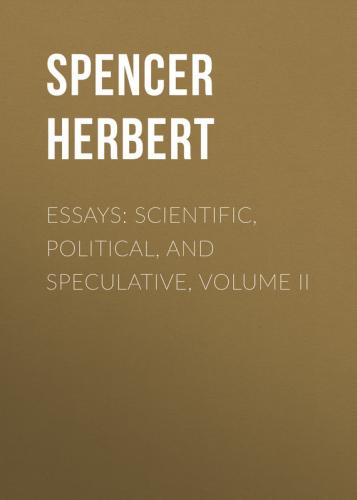me of an objection that may be made to this statement. The production of new compounds by synthesis, has of late become an important branch of chemistry. According to certain known laws of composition, complex substances, which never before existed, are formed, and fulfil anticipations both as to their general properties and as to the proportions of their constituents – as proved by analysis. Here it may be said with truth, that analysis is used to verify synthesis. Nevertheless, the exception to the above statement is apparent only, – not real. In so far as the production of new compounds is carried on merely for the obtainment of such new compounds, it is not Science but Art – the application of pre-established knowledge to the achievement of ends. The proceeding is a part of Science, only in so far as it is a means to the better interpretation of the order of Nature. And how does it aid the interpretation? It does it only by verifying the pre-established conclusions respecting the laws of molecular combination; or by serving further to explain them. That is to say, these syntheses, considered on their scientific side, have simply the purpose of
forwarding the analysis of the laws of chemical combination.
9
This must not be supposed to mean chemically-produced forces. The molecular motion here referred to as dissipated in radiations, is the equivalent of that sensible motion lost during the integration of the mass of molecules, consequent on their mutual gravitation.
10
Embracing the interpretation of such phenomena as the solar spots, the faculæ and the coronal flames.
11
Want of space prevents anything beyond the briefest indication of these subdivisions.
12
Perhaps some will say that such incidental phenomena as those of the heat and light evolved during chemical changes, are to be included among chemical phenomena. I think, however, the physicist will hold that all phenomena of re-distributed molecular motion, no matter how arising, come within the range of Physics. But whatever difficulty there may be in drawing the line between Physics and Chemistry (and, as I have incidentally pointed out in The Principles of Psychology , § 55, the two are closely linked by the phenomena of allotropy and isomerism), applies equally to the Comtean classification, or to any other. And I may further point out that no obstacle hence arises to the classification I am defending. Physics and Chemistry being both grouped by me as Abstract-Concrete Sciences, no difficulty in satisfactorily dividing them in the least affects the satisfactoriness of the division of the great group to which they both belong, from the other two great groups.
